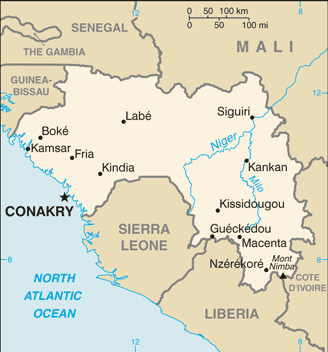Africa > Guinea: Weather, Map, Costs and Travel Guide

Guinea : When and where to go?
Click on a city for complete climate and weather tables
| Town | Jan | Feb | Mar | Apr | May | June | July | Aug | Sept | Oct | Nov | Dec |
| Conakry |  |  |  |  |  |  |  |  |  |  |  |  |
Guinea: Climate & Weather
The climate of Guinea is, according to the zones, tropical or subequatorial, and the diversity of relief divides the territory into four regions with distinct climatic conditions.
In Lower Guinea, the rainy season lasts 6 months, with temperatures between 23 and 35 ° C.
In eastern Guinea, the rainy season is slightly shorter and precipitation is less.
In Upper Guinea, it is a dry tropical climate, and there are only 3 months of the rainy season, with high temperatures due to the harmattan (around 40 ° C) except between December and February when they drop Up to 15 ° C.
It is in Guinée Forestière that the subequatorial climate prevails, with two rainy seasons separated by a short dry season: most of the year the humidity is high and the temperatures oscillate between 24 and 28 ° C.
Given all these data, the best time to visit Guinea is from November to April, which corresponds to the dry season throughout the country.
Weather today

Partly Cloudy
Wind: 7 km/h
Precipitation forecast: 0 mm
> Full report and 7-days forecast
Data updated at 15:25 (local time)
At that time, the weather was:
 31 °C / Haze
31 °C / Haze
Guinea: Map

Sponsored links
What to do in Guinea
You can, for example, discover the Fouta Djalon massif and its forests, where numerous streams, such as the Niger and many waterfalls, including the well-known Voile de la Mariée.
Another remarkable site is the highest peak in West Africa, Mount Nimba, which is registered with UNESCO: it is indeed a true ecological balance to preserve absolutely, and you can go hiking there to discover its Fauna and flora.
On the coast there are beautiful beaches, especially the one of Bel Air and its 7 km of fine sand, and you will not miss to make a detour by the islands of Los. Also practice various water sports in Tamara or Kassa, in a beautiful environment. Discover also the bay of Sangareyah and its mangrove.
Story lovers will see the remains of the Fotoba Penitentiary, and animal lovers will explore the Badiar Park, which protects a fairly diverse fauna. Another curiosity not to be missed: the giant tortoises of Los.
As for the capital Conakry, a coastal town, you can visit its historic center on the island of Tombos, which is connected by a dike to the mainland.
Guinea: The basics
The current currency is the Guinean franc (GNF).
If you come by air, you will land at Conakry Gbessia Airport, but there are other international airports, such as Labé, Kankan and Faranah.
To get around the country, the most commonly used means is the taxi, but you can also find buses and minibuses that run on national roads, and you can also rent a car. Bush taxis take you out of town.
As far as your health is concerned, it is necessary to have your classic vaccines up to date and to add that to yellow fever, obligatory. Do not consume anything that is not peeled or boiled. Avoid swimming in fresh water. Protect yourself against insect and mosquito bites, which are vectors of serious diseases. Take treatment for malaria and avoid contact with animals. Wash your hands frequently and carefully.
Question security, the presence of the Ebola virus is the first reason to avoid Guinea at this time (March 2015). In addition, armed attacks are increasing in Conakry and its suburbs. Night traffic is strongly discouraged. By day, it is necessary to be very vigilant in the populated areas like the markets. Border regions with Liberia and Sierra Leone are strongly discouraged.
For shopping, do not hesitate to stroll in local markets to buy musical instruments (djembe, kora, balafon) or multicolored clothes, carpets, pottery and calabashes.



